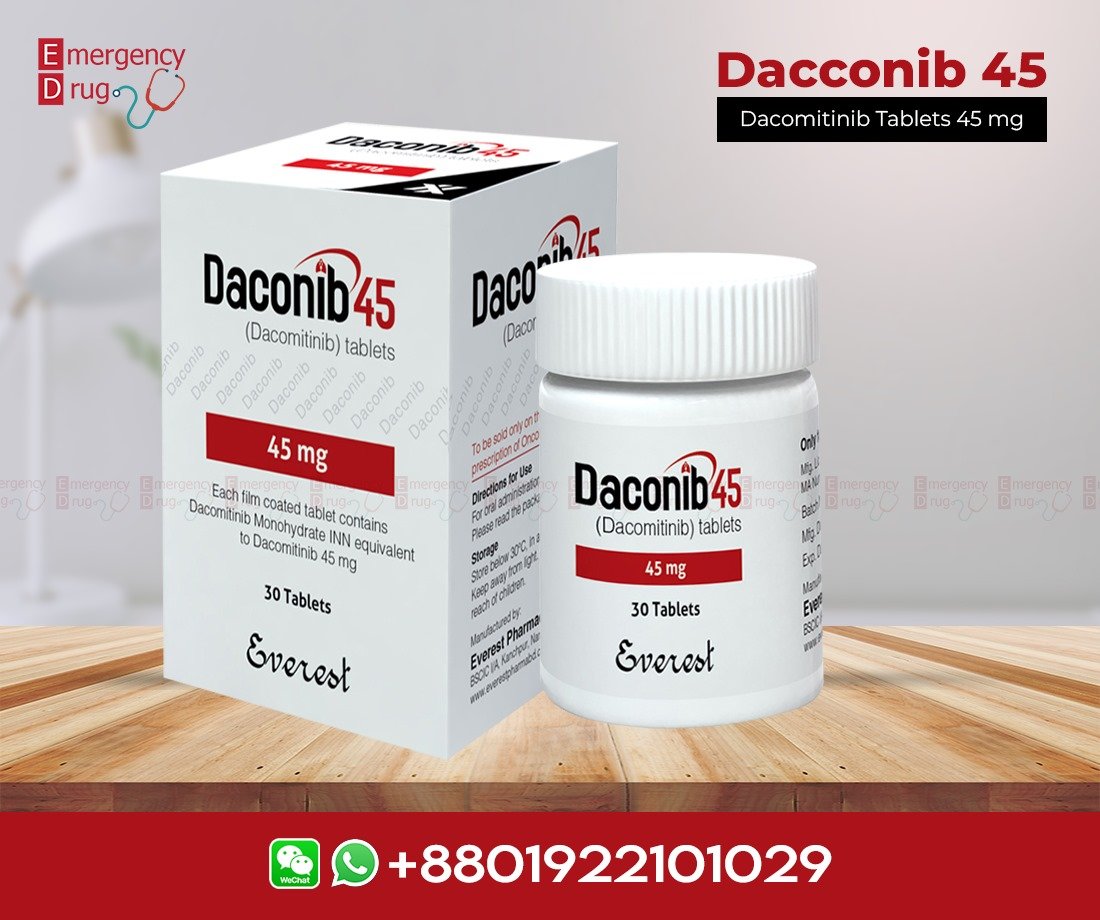Dacomitinib
Dacomitinib
Showing the single result
Dacomitinib – Targeted Therapy for EGFR+ NSCLC
What is Dacomitinib?
Dacomitinib, sold under the brand names Vizimpro® and Daconib, is an FDA-approved oral tyrosine kinase inhibitor (TKI) used as first-line treatment for EGFR mutation-positive metastatic non-small cell lung cancer (NSCLC). It selectively and irreversibly binds to EGFR exon 19 deletions or exon 21 L858R substitutions to block cancer cell growth.
Pronunciation: da-koh-mih-tih-nib
Drug Class: Second-generation irreversible EGFR TKI
Modality: Small Molecule
Indications
Dacomitinib is prescribed for:
-
Locally advanced or metastatic NSCLC with confirmed EGFR exon 19 deletions or exon 21 (L858R) mutations
-
It is not suitable for patients whose tumors harbor the T790M resistance mutation (osimertinib is preferred here)
Off-label research:
There is preliminary evidence for its use in epithelial ovarian cancer, though this requires further clinical validation.
Mechanism of Action
Dacomitinib is a second-generation EGFR inhibitor that:
-
Irreversibly binds to the ATP-binding site of EGFR, HER2, and HER4
-
Blocks phosphorylation of receptor proteins
-
Inhibits downstream signaling pathways that promote cancer cell survival and proliferation
This leads to:
-
Decreased tumor growth
-
Apoptosis (programmed cancer cell death)
-
Reduced resistance from EGFR mutations (partial action against T790M)
Dosage and Administration
-
Usual Dose: 45 mg orally once daily
-
Form: Oral tablet
-
With or without food
-
Do not crush or chew
-
Take at the same time daily
💡 Important: Never change your dose or stop treatment without consulting your healthcare provider.
Side Effects
⚠️ Common Side Effects (≥10% of patients):
| Side Effect | Management |
|---|---|
| Mouth sores/ulcers | Use mouthwash, avoid acidic foods, keep hydrated |
| Loss of appetite & weight loss | Nutritional support, dietitian referral |
| Nausea/Vomiting | Anti-nausea meds, small meals |
| Diarrhea | Antidiarrheal agents, fluid intake |
| Skin rash / acne | Topical treatments, avoid harsh skincare products |
| Hair loss | Temporary, regrows post-treatment |
| Nail inflammation (paronychia) | Topical antibiotic creams |
| Hand-foot syndrome | Use urea-based moisturizers, avoid hot water |
| Dry/red eyes | Artificial tears or ophthalmic solutions |
⚠️ Occasional Side Effects (1–10%):
-
Taste changes
-
Extra hair growth
-
Dehydration
-
Shortness of breath or interstitial lung disease (ILD)
Contact your doctor immediately if you experience lung symptoms, severe diarrhea, or vision changes.
Clinical Pharmacology and Pharmacodynamics
-
IC50 (L858R/T790M cell lines): ~280 nM
-
Activity: Inhibits phosphorylation and cell viability in EGFR-mutant models
-
Half-life: ~70 hours
-
Metabolism: Primarily hepatic via CYP2D6
-
Elimination: Feces (79%) and urine (3%)
ARCHER 1050 (Phase III Trial)
-
Compared with Gefitinib
-
Median progression-free survival (PFS): 14.7 months (Dacomitinib) vs. 9.2 months (Gefitinib)
-
Overall response rate: ~75%
-
Improved overall survival and durability of response
Precautions
Fertility:
-
Unknown effects on fertility
-
Discuss fertility preservation with your oncologist
Pregnancy & Contraception:
-
Category D: May harm a fetus
-
Use effective contraception during treatment and for 2 months after stopping therapy
Breastfeeding:
-
Not recommended due to possible drug transmission through breast milk
Drug Interactions
-
Avoid grapefruit and grapefruit juice
-
May interact with:
-
CYP2D6 inhibitors or inducers
-
Other EGFR inhibitors
-
Certain antibiotics and antifungals
-
Always inform your doctor about all medications, herbal supplements, and OTC drugs.
Monitoring
Required tests before and during therapy:
-
Liver and kidney function tests
-
Complete blood count (CBC)
-
Electrolytes & liver enzymes
-
EGFR mutation testing (FDA-approved companion diagnostic)
Immunizations & Medical Procedures
-
Avoid live vaccines during and for 12 months after treatment
-
Examples: MMR, BCG, yellow fever
-
-
Flu and COVID-19 vaccines are generally safe
Inform any healthcare provider or dentist about your cancer therapy before undergoing procedures or vaccinations.
Final Thoughts
Dacomitinib is a powerful first-line oral treatment for EGFR+ NSCLC. With its targeted, irreversible inhibition of EGFR pathways, it offers extended survival in selected patients. Always follow your oncologist’s advice, monitor side effects closely, and maintain routine follow-ups.
FAQs
Q1: Is Dacomitinib a chemotherapy drug?
No. It’s a targeted therapy, not traditional chemotherapy. It blocks specific molecular targets (EGFR) in cancer cells.
Q2: Can I stop taking Dacomitinib if I feel better?
No. Never stop without consulting your oncologist. Cancer may progress if therapy is discontinued prematurely.
Q3: How long do I take Dacomitinib?
As long as it’s effective and side effects are manageable.
Q4: What if I miss a dose?
Take it as soon as you remember unless it’s close to your next dose. Never double-dose.
Q5: Can I take Dacomitinib with food?
Yes. It can be taken with or without food.

